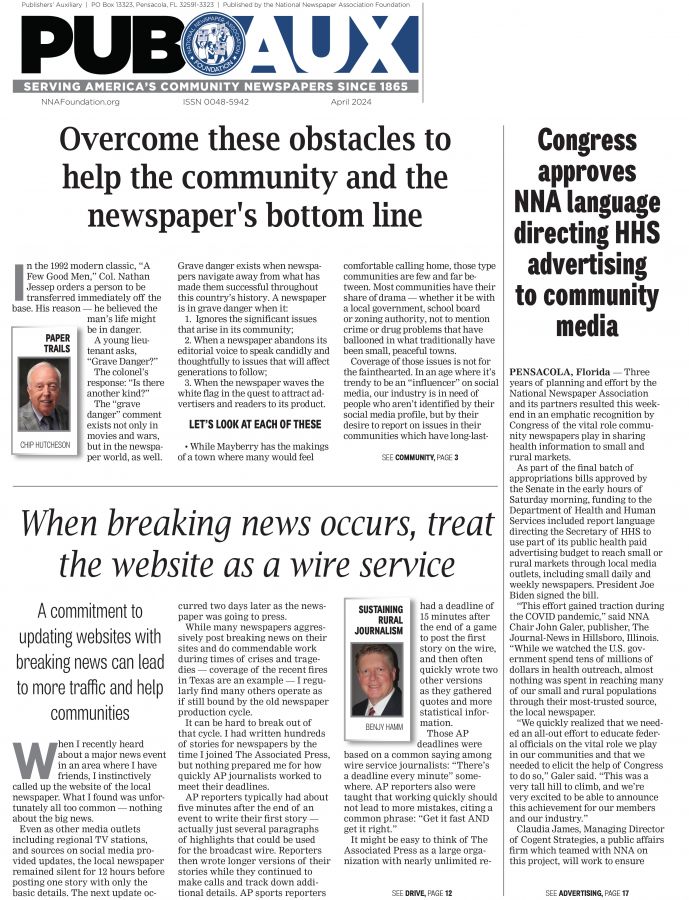House draft bill holds promised postal reform
Jul 6, 2016
By Tonda F. Rush
Director, Public Policy | NNA
WASHINGTON—A draft House of Representatives bill that the sponsors hope will finally propel Congress to enact postal reform measures was circulated in June to organizations with postal interests. The draft represents the long-awaited measure from the House Oversight and Government Reform Committee, chaired by Rep. Jason Chaffetz, R-UT, to match the action in the Senate for revising ground rules for the beleaguered U.S. Postal Service.
Whether the bill arrives too late for the 114th Congress that still has most of the government appropriations bills on its agenda and few legislative days left before the election was the question in the minds of many postal policy watchers.
The bill offers some provisions that the National Newspaper Association and others have requested, including a requirement for postal retirees to use the Medicare benefits that are already being funded for them, instead of the duplicative Retiree Health Benefits fund. The RHB has been a point of controversy since 2006 when the Bush administration required USPS to pay about $5 billion a year in prepayments toward the retirees’ federal health benefits. USPS was plunged almost immediately into negative financial territory by the requirement. It made a few of the required payments and then stopped after the 2008-2009 recession. But it has recognized the obligation on its balance sheet, which ended its latest fiscal year with a $5 billion loss, an exhausted debt allowance and $50 billion in balance sheet deficiencies.
The Medicare shift, which would end the double payment of benefits funds by mailers, would wipe out most of the shortfall in retiree health benefits funds. The shift, which is supported by most unions, represents a concession by the worker groups who have some retirees preferring the RHB benefit because of lower co-pays and more flexible physician choice.
Chaffetz proposes a 2.1 percent increase in postage rates, which would occur the Sunday following the bill’s enactment. It also requires certain mail classes that have not covered costs in recent years to absorb annual 2 percent increases until their “cost coverage” reaches 90 percent. Periodicals mail is among the targeted classes, as it has produced only about 75 percent of the revenue each year that USPS needs to cover the costs of carrying that mail, the Postal Service claims.
The bill also proposes a controversial change in governance by USPS. Instead of the postmaster general and deputy postmaster general’s appointments being made by a presidentially appointed board of governors, these two offices would become direct presidential appointments, and the governors would be reduced to a largely advisory organization. The nine-member board currently has only one member. The Senate’s inaction on confirming nominees has eroded the membership in recent years as Sen. Bernard Sanders, D-VT, reportedly has put a “hold” on votes for Republican nominees and Majority Leader Mitch McConnell, R-KY, has declined to hold votes for Democratic nominees, as a result.
Chaffetz’s bill has other controversial provisions, such as a mandated shift to cluster box delivery for business addresses and a strong push for the postmaster general to consider such aggregation for residential areas.
It does not eliminate Saturday mail delivery. It also takes no action on the potential closing of mail processing plants, unlike a companion Senate bill that was supported by NNA.
Despite the rate increases and concerns over absence of language about mail processing curtailments, NNA issued a statement of cautious optimism about the bill.
NNA President Chip Hutcheson said he believed more discussion would be needed before the proposed bill could be acceptable to a wide majority of USPS stakeholders. But he recognized that until the House began its part of the discussion, the urgently-needed legislation would not pass in this Congress. He said the NNA’s board of directors had repeatedly urged USPS to address shortfalls in mail service, and said it would entertain modest price increases to avoid further shutdowns of mail processing plants.
“It would be difficult for us to support a postage increase, but if we had the assurance that further massive closing of mail processing plants would be averted by a modest increase, our board would be looking very seriously at that deal. We must stop the loss of our subscribers who are disappointed in mail service,” he said. “However, I want to emphasize that discussion of this legislation is not over. NNA will be actively involved in shaping the final bill. We want to thank the primary bill sponsors, including Chair Jason Chaffetz and Ranking Minority Elijah Cummings, for their hard work in taking the process this far.”
NNA Postal Committee Chair Max Heath noted that mailers have benefited from rate stability since 2006 when the Postal Accountability and Enhancement Act was passed. But the inflation-indexed price cap that has held rates down in a slow economy may be in the bull’s-eye of the Postal Regulatory Commission, which in December is tasked with examining how rates will be set in the future.
“Unfortunately, we are all captive of a system that Congress has neglected, in its inability to find consensus on the basic rules of operation,” Heath said. “USPS management has been trying to control costs by trimming service because that is the only tool Congress has provided thus far. Without question, newspapers have been among those in the early sufferer ranks, as we have had widespread complaints about service to subscribers. But even though service has been cut, USPS is still losing money, and there is no prospect for anything but more of the same unless we all get together and demand performance from our members of Congress. That is where the buck stops. If Congress does not do its job, the action shifts to the Commission to solve the problems. Because the commission is empowered to do very little other than raise rates, I think we can all see where we are headed in December. I am urging all of our members to speak out loudly this summer about the need for a viable USPS and reasonably rural mail delivery.”
The bill, which was circulated only in draft form and has not yet been introduced, has been put on a fast track by Chaffetz. He said he hoped to push the bill through his committee in July before the House breaks for the summer political conventions.
The co-sponsors of the bill are Chaffetz and Reps. Elijah Cummings, D-MD; Mark Meadows, R-NC; Gerry Connolly, D-VA and Stephen Lynch, D-MA.
In other actions:
• Sen. Roy Blunt, R-MO, continued his push for USPS to provide service performance reports on rural mail delivery, urging the Financial Services and General Government Committee to push USPS to finish up its work on providing detailed service speed reports by state.
• Both houses of Congress continue to enfold six-day mail service in their versions of USPS appropriations bills as these bills make their way to the floors of these chambers. The general pattern of Congress in recent years has been to fund the government through continuing resolutions at the end of each fiscal year. The six-day mail requirement is expected to continue to be passed as part of these resolutions. USPS has made no aggressive push to end Saturday mail since Postmaster General Megan Brennan took office.
• NNA Postal Committee reported to the NNA directors that it is continuing its efforts to end the requirement for Periodicals mailers to provide marked copies with each mailing. Current rules require publishers to give the post office a copy of each mailed issue that is marked to designate the advertising columns. Heath has called this requirement “antiquated” in the digital age and is urging USPS to change the way it validates compliance with advertising rules.







